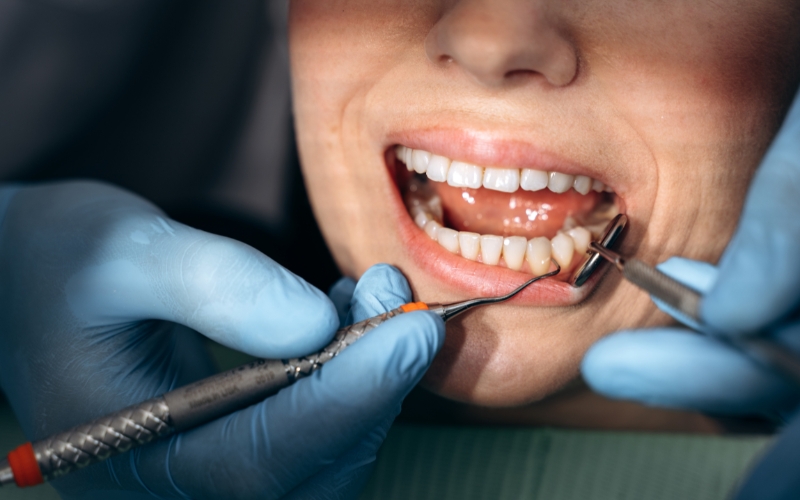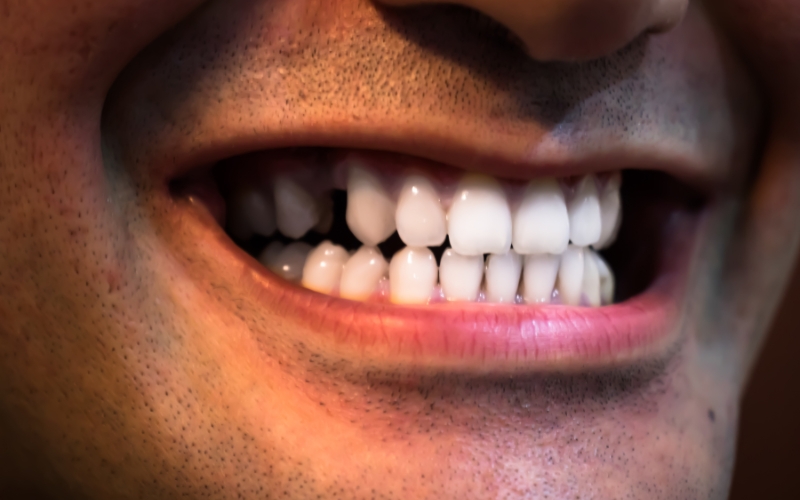
Are you tired of dealing with the pain and discomfort caused by gum disease? Are you looking for ways to promote healthy teeth and gums? Look no further! We’ve compiled a list of 5 tips that will help prevent gum disease and promote overall dental health. We’ve got you covered from proper brushing techniques to regular dental check-ups. Keep reading to learn more about how to keep your smile shining bright!
Gum Disease?
Gum disease, or periodontal disease, is a serious infection of the gums and bones that support your teeth. Gum disease is caused by plaque, a sticky film of bacteria that forms on your teeth. If plaque is not removed, it can harden into tartar (calculus). Tartar promotes gum disease because it is difficult to remove without professional help.
Gum disease begins when the gums are irritated by plaque. This irritation causes the gums to swell and bleed easily. If plaque is not removed, the irritation will progress to inflammation and destruction of the gum tissue and bone that support your teeth. As the disease progresses, the gums pull away from your teeth, forming pockets (spaces) between your teeth and gums. These pockets collect food and plaque bacteria. The bacteria in the plaque produce toxins (poisons) that damage the gums and bones. As periodontal disease progresses, more gum tissue and bone are destroyed. The teeth may eventually become loose and have to be removed.
Fortunately, gum disease can be prevented with good oral hygiene habits at home and regular dental visits for professional cleanings and checkups.
5 Tips for Preventing Gum Disease
It is expected that your smile and facial aesthetics will go through several changes after gum disease. The things that might happen are:
1. Brushing and Flossing
The best way to prevent gum disease is to brush and floss your teeth regularly. Brushing removes plaque from the surface of your teeth, while flossing cleans the spaces in between your teeth where plaque can build up.
It’s important to use a soft-bristled toothbrush and gentle circular motions when brushing. You should also brush for two minutes at least twice a day.
When flossing, be sure to use a clean section of floss for each tooth. Gently insert the floss between your teeth and move it up and down before bringing it out. If you have any questions about how to properly brush or floss, be sure to ask your dentist or dental hygienist during your next appointment.
2. Practice Good Oral Hygiene
Most people know they should brush their teeth at least twice a day and floss once a day, but good oral hygiene involves more than just these basic steps. Here are some tips for preventing gum disease and promoting dental health:
-Use a soft-bristled toothbrush and toothpaste with fluoride. Replace your toothbrush every three months, or sooner if the bristles become frayed.
-Brush your teeth gently in a circular motion. Be sure to brush on the inside surfaces of your teeth and to use a light back-and-forth motion on the chewing surfaces of your molars.
-Floss daily using an up-and-down motion. Be sure to floss under the gum line where plaque can build up.
-Rinse your mouth with water after brushing and flossing. This will help remove any plaque that you may have missed.
-Visit your dentist regularly for professional cleanings and checkups.
3. Regular Dental Visits
See your dentist at least once a year for a professional cleaning and checkup. Regular dental visits are important for maintaining good oral health. During your visit, your dentist will remove any plaque and tartar from your teeth and check for any signs of gum disease. They will also give you a thorough cleaning to help prevent future problems.
4. Eating a Balanced Diet
A balanced diet is essential for maintaining good oral health. Eating a diet rich in fruits, vegetables, and whole grains helps keep teeth and gums healthy by providing the necessary nutrients for proper dental development and preventing gum disease.
In addition to eating a balanced diet, it is also important to limit sugary snacks and drinks as well as acidic foods and drinks. These can damage tooth enamel and lead to cavities. Regular brushing and flossing help remove plaque from teeth and gums, which can also help prevent gum disease.
5. Limiting Sugary Drinks and Foods
Sugary drinks and foods are major causes of tooth decay and gum disease. To limit these problems, it is important to limit the number of sugary drinks and foods you consume. Here are some tips for limiting sugary drinks and foods:
-Cut back on sugary sodas, juices, and energy drinks. These beverages can contain a lot of sugar and acidic ingredients that can damage your teeth. Instead, drink water or unsweetened tea.
-Read food labels carefully. Many processed foods contain hidden sugars that can contribute to tooth decay. Look for products that are low in sugar or made with natural sweeteners like honey or agave nectar.
-Limit between-meal snacks. If you must have a snack, choose something that is not too sugary or sticky. Good choices include raw vegetables, plain yogurt, or whole-grain crackers.
-Chew sugarless gum after meals. Chewing gum helps to remove food particles from your teeth and stimulates saliva production, which helps to protect your teeth from decay.
Conclusion
Taking care of your teeth and gums is essential for a healthy lifestyle. By following the five tips outlined in this article, you can help prevent gum disease while promoting dental health. Brushing twice daily with fluoride toothpaste, flossing regularly, avoiding sugary foods and drinks, visiting the dentist every six months for professional cleanings and checkups, and quitting smoking are all critical steps to maintaining strong oral hygiene. Doing so will help keep your mouth healthy and free from unwanted bacteria that lead to gum disease.



